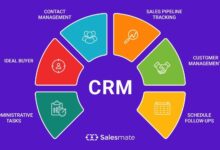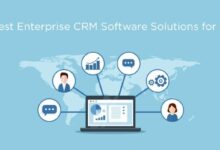Top Cloud-Based CRM Platforms
Top Cloud-Based CRM Platforms are revolutionizing how businesses manage customer relationships. The shift from on-premise systems to cloud-based solutions offers significant advantages, including increased accessibility, scalability, and cost-effectiveness. This exploration delves into the leading platforms, their features, pricing models, and crucial considerations for successful implementation, empowering businesses to make informed decisions about optimizing their customer relationship management.
This comprehensive guide examines the key features, pricing structures, integration capabilities, and security considerations of top cloud-based CRM platforms. We will explore various deployment models and discuss best practices for data privacy and compliance. Real-world case studies will illustrate the benefits and challenges of implementing these systems, offering valuable insights for businesses of all sizes.
Introduction to Cloud-Based CRM Platforms
Cloud-based CRM (Customer Relationship Management) platforms represent a significant shift in how businesses manage their interactions with customers. Instead of relying on software installed and maintained on a company’s own servers (on-premise), cloud-based CRMs utilize a third-party provider’s servers and infrastructure, accessed via the internet. This model offers several key advantages, transforming how companies interact with their clientele.
The advantages of cloud-based CRM systems over their on-premise counterparts are numerous and impactful. Firstly, cloud-based CRMs significantly reduce upfront costs associated with hardware, software licenses, and IT infrastructure maintenance. Secondly, they offer enhanced scalability and flexibility, allowing businesses to easily adjust their CRM capacity to meet fluctuating demands. Finally, accessibility is greatly improved, with authorized personnel able to access the system from anywhere with an internet connection, fostering better collaboration and responsiveness. This contrasts sharply with on-premise solutions, which are limited by geographical location and require specialized IT expertise for maintenance and upgrades.
Industries Utilizing Cloud-Based CRMs
Cloud-based CRMs have become indispensable across a wide range of industries. Their adaptability and scalability make them suitable for businesses of all sizes, from startups to large enterprises. The following examples illustrate the diverse applications of cloud-based CRMs.
Salesforce in the Tech Industry: Companies in the technology sector, such as software developers and hardware manufacturers, leverage cloud-based CRMs like Salesforce to manage complex sales pipelines, track customer interactions across multiple channels (email, phone, social media), and forecast sales trends. The ability to quickly access and share customer data across sales teams improves efficiency and accelerates deal closure. Salesforce’s features like lead management, opportunity tracking, and sales forecasting are particularly valuable in this fast-paced environment.
HubSpot in Marketing and Advertising: Marketing and advertising agencies rely heavily on cloud-based CRMs, such as HubSpot, for managing customer interactions throughout the marketing funnel. These platforms integrate marketing automation tools, enabling agencies to personalize campaigns, track customer engagement, and measure the effectiveness of marketing efforts. HubSpot’s features, including email marketing, social media management, and contact management, streamline workflows and provide valuable insights into customer behavior.
Zoho CRM in Small and Medium-Sized Businesses (SMBs): Zoho CRM caters specifically to the needs of small and medium-sized businesses across various sectors. Its user-friendly interface and affordable pricing make it an attractive option for companies seeking to improve customer relationships without significant investment. Zoho CRM’s functionality, encompassing contact management, sales pipeline tracking, and customer support, helps SMBs improve operational efficiency and build stronger customer relationships, ultimately contributing to business growth.
Top Features of Leading Cloud-Based CRM Platforms
Cloud-based CRM platforms offer a range of features designed to streamline sales, marketing, and customer service processes. The most effective platforms share a core set of functionalities that contribute to improved efficiency and enhanced customer relationships. Understanding these key features is crucial for businesses selecting the right CRM solution.
Essential Features of Top-Tier Cloud-Based CRM Platforms
Five essential features consistently found in leading cloud-based CRM platforms are contact management, sales force automation, marketing automation, reporting and analytics, and customer support integration. Contact management provides a centralized repository for all customer information, enabling easy access and updates. Sales force automation streamlines sales processes, automating tasks such as lead tracking and opportunity management. Marketing automation tools facilitate targeted campaigns and personalized communications. Robust reporting and analytics provide insights into sales performance and customer behavior, informing strategic decisions. Finally, integration with customer support channels ensures seamless communication and issue resolution. These features, working in concert, create a powerful system for managing customer interactions and driving business growth.
UI/UX Design Comparison of Leading Platforms
The user interface and user experience (UI/UX) significantly impact the effectiveness of a CRM platform. Different platforms adopt varying design philosophies, resulting in diverse user experiences. This comparison focuses on three leading platforms: Salesforce, HubSpot, and Zoho CRM.
| Platform Name | UI/UX Strengths | UI/UX Weaknesses | Overall UI/UX Score |
|---|---|---|---|
| Salesforce | Highly customizable, powerful features, extensive integrations, robust reporting. | Can be complex for beginners, steep learning curve, some features may feel overwhelming. | ★★★★☆ |
| HubSpot | Intuitive and user-friendly interface, strong focus on marketing automation, seamless integration with other HubSpot tools. | Fewer advanced features compared to Salesforce, limited customization options in certain areas. | ★★★☆☆ |
| Zoho CRM | Affordable, comprehensive features, good customization options, relatively easy to learn. | Can feel less polished than Salesforce or HubSpot, reporting capabilities may be less sophisticated. | ★★★☆☆ |
Scalability and Customization Options
Scalability and customization are critical considerations when choosing a cloud-based CRM platform. Scalability refers to the platform’s ability to adapt to a growing business’s needs, handling increased data volume and user accounts without performance degradation. Customization refers to the ability to tailor the platform to specific business requirements, configuring workflows, fields, and integrations to optimize processes. Salesforce, for example, offers extensive scalability and customization options, catering to large enterprises with complex needs. HubSpot provides good scalability but offers less extensive customization compared to Salesforce. Zoho CRM offers a balance between scalability and customization, suitable for businesses of varying sizes. The choice of platform depends on the specific scalability and customization needs of the organization. A smaller business with simpler requirements might find Zoho CRM sufficient, while a large enterprise with complex workflows would likely benefit from Salesforce’s extensive capabilities.
Pricing and Deployment Models
Choosing the right cloud-based CRM involves careful consideration of both pricing and deployment. Understanding the various models available is crucial for aligning your business needs with the most cost-effective and efficient solution. Different vendors offer diverse pricing structures and deployment options, catering to businesses of all sizes and technical capabilities.
Pricing models for cloud-based CRMs are generally subscription-based, offering varying levels of access and features depending on the chosen plan. Deployment models, on the other hand, dictate where your CRM data resides and how it’s accessed, influencing security, control, and scalability.
Pricing Models for Cloud-Based CRMs
Major cloud-based CRM providers typically offer subscription-based pricing, often structured around the number of users or the features included. Per-user pricing is common, where the cost scales directly with the number of individuals accessing the system. Some vendors also offer tiered pricing plans, providing different feature sets at varying price points. Add-on features and integrations may also incur additional charges. It’s important to thoroughly review the pricing details to ensure the selected plan meets the business’s current and future needs.
Examples of Pricing Tiers
The pricing tiers for three prominent platforms (note: prices and features are subject to change and should be verified directly with the provider) are outlined below. These examples illustrate the common structure of tiered pricing, allowing for flexibility based on organizational requirements.
- Platform A:
- Basic: Limited users, core CRM features (contact management, basic reporting), limited storage.
- Professional: Increased user capacity, advanced reporting and analytics, integration with popular tools, moderate storage.
- Enterprise: Unlimited users, all features, extensive customization options, high storage capacity, dedicated support.
- Platform B:
- Starter: Small number of users, essential CRM functionalities, basic support.
- Growth: Mid-sized user base, advanced features including sales automation and marketing tools, enhanced support.
- Premium: Large user capacity, comprehensive feature set, priority support, custom development options.
- Platform C:
- Team: Designed for small teams, limited users, basic features, affordable pricing.
- Business: Suitable for growing businesses, increased user limit, advanced functionalities like workflow automation, improved analytics.
- Enterprise: Scalable solution for large organizations, comprehensive features, customized solutions, dedicated account management.
Cloud-Based CRM Deployment Models
Cloud-based CRMs offer various deployment models to suit different organizational needs and security preferences. The choice of deployment model influences factors such as data security, control, and cost.
- Public Cloud: The CRM software and data are hosted on the vendor’s servers, accessible via the internet. This is generally the most cost-effective option, offering scalability and ease of use. However, it may involve sharing resources with other users and might present slight concerns regarding data control compared to other models.
- Private Cloud: The CRM is hosted on dedicated servers, exclusively for the organization. This offers greater control over data security and customization, but it’s usually more expensive to implement and maintain than a public cloud solution. This model provides a higher level of security and compliance for organizations with strict data regulations.
- Hybrid Cloud: A combination of public and private cloud deployments. Certain aspects of the CRM might be hosted on a public cloud for cost-effectiveness and scalability, while sensitive data or critical applications could reside on a private cloud for enhanced security and control. This model offers a balance between cost and security, enabling businesses to tailor their deployment based on specific needs.
Integration Capabilities and APIs
The power of a cloud-based CRM extends far beyond its core functionality. Seamless integration with other business applications is crucial for maximizing efficiency and extracting valuable insights from disparate data sources. A well-integrated CRM system acts as a central hub, streamlining workflows and providing a unified view of customer interactions across various departments. This section will explore the importance of CRM integrations, examine examples of APIs offered by leading platforms, and discuss the challenges and best practices involved in this critical aspect of CRM implementation.
Effective integration with other business applications significantly enhances the value proposition of a CRM system. By connecting the CRM to marketing automation platforms, for example, businesses can automate marketing campaigns based on customer behavior tracked within the CRM. Similarly, integration with email marketing tools allows for personalized email communications, while accounting software integration streamlines invoicing and payment processing. The result is a more cohesive and efficient operation, improving customer relationships and boosting overall business performance.
API Examples and Functionalities
Leading CRM platforms like Salesforce, Microsoft Dynamics 365, and HubSpot offer robust APIs (Application Programming Interfaces) that allow developers to connect their CRM with other applications. These APIs expose various functionalities, enabling developers to build custom integrations tailored to specific business needs. For example, Salesforce’s REST API allows developers to access and manipulate data within Salesforce using standard HTTP requests. This enables integration with a wide range of applications, from custom-built internal tools to third-party marketing automation platforms. Microsoft Dynamics 365 also provides RESTful APIs, offering similar capabilities for data access and manipulation. HubSpot’s API allows developers to access and manage contacts, companies, deals, and other key CRM data, facilitating integration with various marketing and sales tools. These APIs often include features for authentication, data retrieval, and data manipulation, ensuring secure and efficient data exchange.
Challenges and Best Practices for CRM Integration
Integrating different CRM systems or integrating a CRM with other applications presents several challenges. Data inconsistencies across systems can lead to inaccurate reporting and decision-making. Maintaining data integrity during integration requires careful planning and execution. Security is another key concern; secure data transfer and access control mechanisms are essential to prevent unauthorized access and data breaches. Furthermore, managing the complexity of multiple integrations can be challenging, requiring skilled developers and robust integration platforms.
To mitigate these challenges, several best practices should be followed. A well-defined integration strategy is crucial, outlining the scope, objectives, and timelines of the integration project. Data mapping and transformation are essential to ensure data consistency and accuracy across systems. Choosing the right integration tools and technologies is also critical, selecting tools that are compatible with both the CRM and other applications and that offer robust security features. Thorough testing and validation are essential to ensure the integration functions correctly and meets the defined requirements. Finally, ongoing monitoring and maintenance are crucial to address any issues that may arise and to ensure the continued smooth operation of the integrated systems. Regular updates and patches are essential for both the CRM and any integrated applications to maintain security and functionality.
Security and Data Privacy Considerations
The security and privacy of customer data are paramount when choosing a cloud-based CRM platform. Top providers invest heavily in robust security measures to protect sensitive information, but understanding these measures and potential risks is crucial for businesses of all sizes. This section will outline the typical security protocols employed and explore potential breach scenarios and responses.
Leading cloud-based CRM platforms employ a multi-layered approach to security. This typically includes data encryption both in transit (using protocols like HTTPS) and at rest (using encryption algorithms like AES-256). Access controls, based on role-based permissions, restrict access to data based on employee roles and responsibilities. Regular security audits and penetration testing help identify and address vulnerabilities proactively. Many platforms also leverage advanced threat detection systems, including intrusion detection and prevention systems (IDPS), to monitor for and respond to suspicious activity. Furthermore, they often comply with various industry-standard security certifications, such as ISO 27001 and SOC 2, demonstrating their commitment to data security.
Data Breach Response Scenario
Imagine a scenario where a phishing attack successfully compromises the credentials of a sales representative with access to a significant portion of a company’s customer data within a leading CRM platform. The attacker gains access and attempts to exfiltrate the data. A leading CRM platform’s response would likely involve several steps. First, the platform’s security systems would detect the unusual activity – perhaps multiple login attempts from an unfamiliar location or a large volume of data being accessed. This would trigger alerts to the platform’s security team and potentially the client. Second, the platform would immediately lock the compromised account and initiate an investigation. This might include reviewing system logs to identify the extent of the breach and the data accessed. Third, the platform would work with the client to implement remedial actions, such as resetting passwords, reviewing access controls, and potentially engaging forensic experts. Finally, the platform would provide notification to affected customers, as required by relevant regulations like GDPR, and cooperate fully with any law enforcement investigations.
Best Practices for Data Privacy and Compliance
Organizations using cloud-based CRM platforms should implement several best practices to ensure data privacy and compliance. This includes establishing clear data governance policies, defining roles and responsibilities for data handling, and regularly reviewing and updating security protocols. It’s crucial to choose a platform that complies with relevant regulations such as GDPR, CCPA, and HIPAA, depending on the industry and geographic location. Regular employee training on security awareness and phishing prevention is also vital. Finally, organizations should leverage the platform’s built-in security features, such as data encryption, access controls, and audit trails, to maximize data protection.
Case Studies
Real-world examples showcase the transformative power of cloud-based CRM systems across diverse industries. Analyzing successful implementations reveals best practices, highlights challenges overcome, and demonstrates the measurable benefits achieved. This section presents two case studies: one focusing on a large enterprise in the healthcare sector and another illustrating the positive impact on a small business.
Healthcare Provider CRM Implementation
This case study details the successful implementation of a cloud-based CRM system by a large healthcare provider. The organization faced challenges including disparate data systems, inefficient patient communication, and difficulty tracking patient interactions across multiple departments. The chosen CRM system integrated seamlessly with their existing EHR (Electronic Health Record) system, providing a unified view of patient data.
The implementation process involved the following steps:
- Needs Assessment and System Selection: A thorough analysis of existing processes and requirements led to the selection of a CRM platform offering robust features for patient management, appointment scheduling, and communication.
- Data Migration: Existing patient data was carefully migrated to the new CRM system, ensuring data integrity and minimizing disruption to operations. This involved data cleansing and validation to ensure accuracy.
- User Training and Adoption: Comprehensive training programs were developed and implemented to ensure all staff members were proficient in using the new system. Ongoing support and feedback mechanisms were established to address any challenges.
- Integration with EHR: The CRM system was integrated with the existing EHR system, allowing for seamless data flow and a unified view of patient information. This reduced data entry duplication and improved data accuracy.
- System Optimization and Ongoing Support: Post-implementation, the system was continuously monitored and optimized to ensure optimal performance and address any emerging issues. Regular updates and maintenance were performed.
The result was improved patient care, enhanced communication, increased operational efficiency, and a significant reduction in administrative overhead. Key performance indicators (KPIs) such as appointment scheduling efficiency, patient satisfaction scores, and reduced wait times improved substantially.
Small Business Success Story: “Artisan Coffee Roasters”
Artisan Coffee Roasters, a small coffee roastery and cafe, struggled with managing customer relationships and tracking sales effectively using spreadsheets and a basic point-of-sale system. Switching to a cloud-based CRM dramatically improved their business operations.
The transition involved:
- Simple CRM Selection: They chose a user-friendly CRM with features relevant to their needs, such as contact management, order tracking, and marketing automation tools.
- Data Import and Setup: Existing customer data was imported, and the system was configured to track key metrics such as sales, customer preferences, and loyalty program participation.
- Staff Training: A brief training session was sufficient due to the CRM’s intuitive interface. The staff quickly adapted to the new system.
- Integration with POS: The CRM was integrated with their point-of-sale system, enabling automatic updates of customer purchases and preferences.
This simple implementation yielded significant improvements. Artisan Coffee Roasters saw an increase in repeat business, more effective targeted marketing campaigns, and better inventory management.
Metrics for Measuring CRM Success
Measuring the success of a cloud-based CRM implementation requires tracking key performance indicators (KPIs). These metrics provide quantifiable evidence of the system’s impact on business operations. Examples include:
- Customer Acquisition Cost (CAC): Tracking the cost of acquiring new customers allows for assessing the efficiency of marketing efforts and the ROI of the CRM system.
- Customer Lifetime Value (CLTV): This metric measures the total revenue generated by a customer over their relationship with the business. A well-implemented CRM should increase CLTV.
- Sales Conversion Rate: Monitoring the percentage of leads that convert into sales helps assess the effectiveness of sales processes and the CRM’s contribution to sales performance.
- Customer Satisfaction (CSAT): Measuring customer satisfaction through surveys and feedback mechanisms provides insights into customer experience and the impact of the CRM on customer relationships.
- Return on Investment (ROI): Calculating the return on investment for the CRM implementation demonstrates the financial benefits of the system. This considers the cost of implementation, maintenance, and the increased revenue and reduced costs generated.
Last Recap
Ultimately, selecting the right cloud-based CRM platform hinges on a careful assessment of a business’s specific needs and priorities. Factors such as budget, scalability requirements, integration needs, and desired level of customization all play a crucial role. By understanding the strengths and weaknesses of different platforms, businesses can leverage the power of cloud-based CRM to enhance customer relationships, streamline operations, and drive growth. This guide provides a framework for making an informed decision and embarking on a successful CRM journey.





